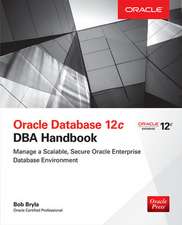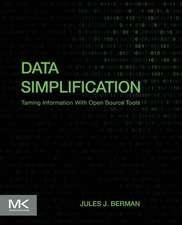Principles of Big Data: Preparing, Sharing, and Analyzing Complex Information
Autor Jules J. Bermanen Limba Engleză Paperback – 3 iul 2013
- Learn general methods for specifying Big Data in a way that is understandable to humans and to computers
- Avoid the pitfalls in Big Data design and analysis
- Understand how to create and use Big Data safely and responsibly with a set of laws, regulations and ethical standards that apply to the acquisition, distribution and integration of Big Data resources
Preț: 254.61 lei
Preț vechi: 373.07 lei
-32% Nou
Puncte Express: 382
Preț estimativ în valută:
48.73€ • 50.68$ • 40.23£
48.73€ • 50.68$ • 40.23£
Carte tipărită la comandă
Livrare economică 08-22 aprilie
Preluare comenzi: 021 569.72.76
Specificații
ISBN-13: 9780124045767
ISBN-10: 0124045766
Pagini: 288
Ilustrații: black & white tables, figures
Dimensiuni: 191 x 235 x 20 mm
Greutate: 0.59 kg
Editura: ELSEVIER SCIENCE
ISBN-10: 0124045766
Pagini: 288
Ilustrații: black & white tables, figures
Dimensiuni: 191 x 235 x 20 mm
Greutate: 0.59 kg
Editura: ELSEVIER SCIENCE
Public țintă
data managers, data analysts, statisticiansCuprins
1. Big Data Moves to the Center of the Universe
2. Measurement
3. Annotation
4. Identification, De-identification, and Re-identification
5. Ontologies and Semantics: How information is endowed with meaning
6. Standards and their Versions
7. Legacy Data
8. Hypothesis Testing
9. Prediction
10. Software
11. Complexity
12. Vulnerabilities
13. Legalities
14. Social and Ethical Issues
2. Measurement
3. Annotation
4. Identification, De-identification, and Re-identification
5. Ontologies and Semantics: How information is endowed with meaning
6. Standards and their Versions
7. Legacy Data
8. Hypothesis Testing
9. Prediction
10. Software
11. Complexity
12. Vulnerabilities
13. Legalities
14. Social and Ethical Issues
Recenzii
"By stressing simple, fundamental concepts, this book teaches readers how to organize large volumes of complex data, and how to achieve data permanence when the content of the data is constantly changing. General methods for data verification and validation, as specifically applied to Big Data resources, are stressed throughout the book." --ODBMS.org, March 2014
"The book is written in a colloquial style and is full of anecdotes, quotations from famous people, and personal opinions." --ComputingReviews.com, February 2014
"The author has produced a sober, serious treatment of this emerging phenomenon, avoiding hype and gee-whiz cases in favor of concepts and mature advice. For example, the author offers ten distinctions between big data and small data, including such factors as goals, location, data structure, preparation, and longevity. This characterization provides much greater insight into the phenomenon than the standard 3V treatment (volume, velocity, and variety)." --ComputingReviews.com, October 2013
"The book is written in a colloquial style and is full of anecdotes, quotations from famous people, and personal opinions." --ComputingReviews.com, February 2014
"The author has produced a sober, serious treatment of this emerging phenomenon, avoiding hype and gee-whiz cases in favor of concepts and mature advice. For example, the author offers ten distinctions between big data and small data, including such factors as goals, location, data structure, preparation, and longevity. This characterization provides much greater insight into the phenomenon than the standard 3V treatment (volume, velocity, and variety)." --ComputingReviews.com, October 2013























